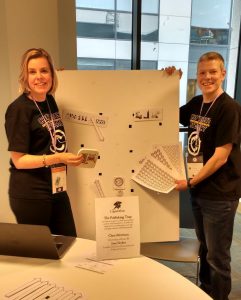Chris Morrison, Copyright and Licensing Compliance Officer at the University of Kent, and Jane Secker, Copyright and Digital Literacy Advisor at LSE and Chair of the CILIP Information Literacy Group, introduce a game they have designed to help academics, researchers and PhD students understand the scholarly communication process. The Publishing Trap was a runner-up at LILAC 2016‘s popular Lagadothon event.
Introduction
Inspired by our work on Copyright the Card Game, we decided to create a new game aimed at academics, PhD students and researchers to help them understand the scholarly communication process and the impact of the choices they make when disseminating their research findings. The Publishing Trap is a prototype game we created and that we pitched at the LILAC Lagadothon in March 2016. It won a runner’s up prize and this case study describes the aim of the game, how the game works and their ideas about the game to date.
Aim of the Game
The Publishing Trap is a game about research dissemination and scholarly communication in Higher Education. The game corresponds to the career of a researcher and they are presented with a series of scenarios about which they have to make choices. For each round, the researcher is required to make decisions about how to disseminate their research, through traditional publishing options, open access and using tools such as social media. Ultimately the game helps researchers to understand how money, intellectual property rights, and both open and closed publishing models affect the dissemination and impact of their research. Through playing the game in teams, they get to consider the impact of their choices throughout their academic career. The game ends with a final round where the researcher sees the consequences of the choices they have made and is rewarded with money, knowledge and impact tokens.
The Audience
It is aimed at early career researchers and academics, as well as anyone who has a vested interested in understanding how access to information works and how the whole scholarly communication system in higher education operates. Although it is not intended to promote any particular ideological position, it should be valuable to staff who are advocating for a greater acceptance of open access publishing models and trying to encourage academic staff to make informed choices when they sign publishing contracts and submit their work to the institutional repository.
Game play

It is played in teams of up to six people – with each team having a board and a range of pieces. The workshop leader acts as a host and presents the scenarios to the teams during each round. Each round is therefore a decision point so the game is similar to a ‘choose your own adventure’ game. After hearing the scenario, each team is free to choose from a number of pre-determined options. They are distributed with various pieces, which they must attach to the board during each round. At the end of each round, the teams discuss the decisions they have reached and are asked to justify their choices.
During this game, players will learn that information has value, is subject to privilege and access to knowledge is constructed and contextual. However, they will also learn that many pragmatic decisions may need to be made during an academic career and there are trade offs between academic promotion, building your own reputation, earning a living, scoring highly in the Research Excellence Framework (or non-UK equivalent), and being able to share your research findings widely with anyone in the world.
Instructions
The aim of the game is for players to connect their research with wider world. The first decision point at the end of round one is to choose the best output of research findings. Here the teams are given a fairly straightforward choice about depositing their thesis on open access or embargoing it so they can try to get it published as a book.
They are given various pieces at the end of each round and they build up their route on the board. Each team gets to choose from a series of research outputs cards and are also given connector pieces – where they can choose things such as the licence they might want to use on their work.
Scoring and winning the game
The scoring mechanism is still in development but we are considering whether points are awarded at the end of each round or if the points are added up at the end of the game. During the Lagadathon at LILAC, we added up the scores at the end of the game. Because the Publishing Trap is a game of knowledge, impact and money, the points were given as chocolate owls to represent knowledge, chocolate stars to represent impact and chocolate money for money.
The final round
The final round of the game is a Wheel of Fortune, where each team has to spin the wheel. There are various stakeholders who might want to access their research but are based outside of Higher Education (a doctor in the NHS, a government official, a school teacher, etc.). Based on the choices the team has made, the visibility of their research is then assessed. Some of the possible outcomes are that the research may be highly rated in academic journals, but behind a paywall and so not publicly accessible, or may be accessible on social media but have made a limited impact within their academic discipline.
Next steps
The prototype game still requires considerable work to develop it further. We hope to enlist interested people to take part in testing out the prototype game over the coming six months, so we can refine it further and develop both the scenarios for each round and the scoring system.
If you have any questions or would like to find out more, then please get in touch with us at: ukcopyrightlit@gmail.com. You can read a blog post we wrote about the game on our website.
